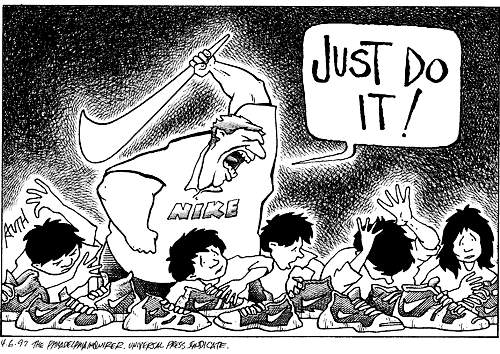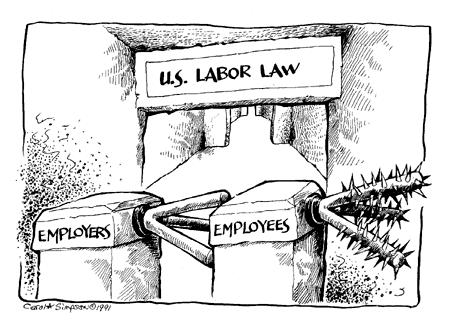|
|||||||||||||
|
To Overthrow Capitalism?
A Diagnosis of the By Punkerslut
Exploitation, the First Cause
The first reason why anyone would oppose Capitalism is because this economic institution acts as a parasite. Every worker, no matter how much they must produce to feed themselves, must produce extra to feed their boss, employer, or group of stockholders. The income is split between the costs of industry, the employer, and the employee. Fourth, fifth, and sixth cuts are taken out by the state, the middleman, and the final distributor. Each one of these groups take their toll on the product but contribute nothing. They simply stamp it as approved, living off of the proceeds from the sales without producing or creating. If there is an initial displeasure with Capitalism, it is this: the many who work receive very little, while those few who do not labor receive the greatest income. In a single word, we Socialists have called this Exploitation, or the levying of a profit or tax on a product justified solely by possession. Poverty, the Product of Exploitation
What happens when society becomes increasingly divided? What happens when smaller companies are bought up by bigger and more efficient companies? What happens when the economy's private property sector is represented continually by fewer and fewer people? The phrase used by historians is Industrial Revolution, and the few Capitalists owning everything is a result of the increased efficiency of machinery and collective work. When the workers receive so little, and the Capitalists receive so much, it is only time before the workers cannot buy all that surplus they create. Our human will and ambition in laboring is a curse, as when we produce too much, famine isn't abolished -- it is increased, because more workers are laid off. Poverty will continue to exist so long as the few continue to scrape the profits off of their deeds. There is land enough for everyone to work, eat, and have opportunity -- but it is bottled up in the hands of a few, because they do not see any profit in using it to feed the people. Massive Environmental Destruction, a Result of Private Property
The U.S. Chamber of Commerce, well-respected as the most powerful group of Capitalists in the United States, has openly stated that it does not believe in environmental destruction. [*1] Far from taking a responsible approach, such as doing research and publishing studies, they have called for public trial where their lawyers intend to "cross-examine the evidence." It is not just the delusions of businesspeople who are accustomed to the law world, actually thinking they can file a lawsuit against an idea. They know, above all, that any evidence of environmental destruction is evidence of Capitalists destroying the environment. There is no other source, and that is why they fight against any effort to investigate or eliminate the world's pollution. Factories and manufacturing are the greatest contributor of environmental problems. Air is polluted by the smog of diesel engines, the emissions of manufacturing plants, and the various, toxic pesticides used all over the world. Every fish in the world has mercury in it, and there are even health warnings against eating particular foods for pregnant women, because entire kingdoms of animal life have been contaminated with chemicals. Where does mercury come from and who uses it? It strictly has an industrial use in factories, just like coal and oil. And every type of mass, environmental destruction that has occurred is not due to "the activities of individuals," but due to the private possession of industry and land by those who are not negatively effected by environmental destruction. Crime and Theft, the Conclusion of Poverty
What can you expect from a human being who is starving or freezing to death? In a single word, you can expect desperation. For the Capitalist, this is good in a variety of ways. First, it makes the worker accept lower and lower wages -- it makes the individual obedient while watching their children suffer undernourishment. And second, it drives the worker towards criminality. Hunger is hunger and starvation is starvation. A human being, feeling those pangs strike at their belly, must naturally be less afraid of being arrested than shrinking into a husk on the sidewalk. But if the human being has a right to life, then they must naturally have a right to everything that makes that right real -- they must have a right to the land, to work, and to reap the benefits of that work. A fair job will provide everything to the worker that they produce, and this would be significantly greater than what anyone could make from petty theft. The simple fact is that the economy needs to make theft unprofitable if it expects to do away wit hit. If people want to get rid of mugging and burglary, they should forget about trying to deliver "moral backbone from the one and only holy god" to the people who need to be "corrected." People don't think about heavenly values when their stomach rumbles for food. Everyone should have the right to work and to receive the benefit from their work, the only way to provide no incentive to criminal behavior. This is not a way of giving morality to the poor who possess nothing -- it is the beginning of approaching anything resembling morality for those who own all of the land. Discrimination, a Choice of the Owner
A customer is denied service or a worker is denied employment, and the decision was based on some irrelevant characteristic like race or gender. This is discrimination, and it is no longer popular, but everywhere, it is forgotten that it was -- and continues to be -- a choice of the owners of industry. It is not a choice of the many who must labor and produce the amazing functioning of collective work. It is those who own the means of work but who themselves do not work. Today, discrimination still occurs, and it is very difficult to prove it, even when it is the case. In other cases, it has been legalized, such as a Supreme Court ruling in 1990 that allowed employers to discriminate against those practicing the Native American religion. [*2] Similarly, the National Labor Relations Board (NLRB) regularly permits any employer to fire any worker for trying to organize a worker -- and no other reason is required. [*3] [*4] Such a policy of excluding certain people, based on characteristics of race or religion or ideas, is not an inherent characteristic of the people themselves, no matter what national history you consider. Where excessive racism and intolerance have reached such impressive heights, in Nazi Germany for example, it only came after a prolonged, widespread campaign promoting anti-Semitism. It has been used as a factor for dividing the people against each other. This doesn't serve the people, who themselves are largely workers or dependent upon the workers. It only serves a very few who possess the means of production, who themselves can act as morally and dignified as they like, relying on "tradition" as an excuse for opposing certain types of people they simply do not like. And they carry on their moral campaigns of exclusion, no matter how much it costs -- because we're paying for it with our labor.
Democratic Government, With Undemocratic Economy
If the economy of a society is corrupted, then no institution can escape this taint. If dictators determine the hours of work, the rates of wages, the prices of products, whether a factory shall function or stand idle, whether a field shall be harvest or its crops left to rot -- if dictators and monarchs rule the economy, then there is no hope for Democracy in government. Every politician, in order to gain votes in an electoral system, must spread their message on television, radio, and in the streets. This requires, above all, funding, and every election is a testament to this fact. This means that those who own the television and radio stations may choose the president, governor, mayor, or political party that they like. The debates only have 'official political parties' and the people are only allowed to see the candidates presented by the television owners. We do have a nation where every person has one vote, but there are a handful people who control the votes of over a hundred million Americans. Politicians, far from being the conscious citizen rising to the front of society when there is a crisis, is actually a pawn of the political party -- rising to the top where they hold a political office, after years of showing themselves selflessly committed to the party's masters. This system is of greatest benefit to those who possess the deeds of the lands, the factories, and the banks. All they must do is support those politicians whose goals are already in line with their own, whether it's restricting trade, cutting the minimum wage, or increasing the military, "all in the name of American tradition and strength." The leaders may be voted upon by the masses, but they are presented to the public first by the political parties, then by the powerful wealthy interests, and then by the owners of media. The system of checks and balances is between different segments of Capitalists, not between different branches representing the people. Alienation From Your Own World
When looking at all of these problems, from miserable working conditions to poverty to environmental destruction to crime to discrimination to democracy -- when looking at all of this, we struggle with a reason why it must happen. And then it occurs, almost clearly and plainly as daylight, that this happens because we are not in control of our own world. The farms and the factories, the police departments and the parliaments, the army and the navy, all of it is for the glory, the power, and the benefit of a very few. The only thing that guarantees this is possession of society's productive forces. It is because the wealthy own all of the land and all of the productive instruments that they may cause these problems. It is because the Capitalist is given a choice that discrimination occurs; it is because the Capitalist is given a profit incentive that environmental destruction occurs; it is because the Capitalist cannot profit by well-satisfied working class that unemployment occurs. You are alienated from society. You do not control the elected officials or the police officers. You do not have the right to dictate the terms of your working conditions and your wages. You do not have the right to make or pass laws or to veto or reject those passed against you. It is because you have no control over the economy that you need to live that you become so powerless in the face of such great poverty. And you are alienated, not just from society's productive instruments, but from the very act of genuine life in society itself! Anything you do, from the organization of your workplace to interacting with others once you leave work, is done in an artificial society -- we are responsible for producing everything that we experience, but none of it is done by our own will or direction. We are the puppets in the dream of a Capitalist, but for us it is a nightmare. Punkerslut, Resources *1. "U.S. Chamber of Commerce seeks trial on global warming," by Jim Tankersley, August 25, 2009, published in the Los Angeles Times (LA Times), LaTimes.com Link.
|




